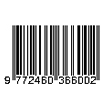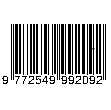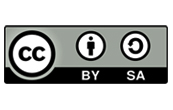- Focus and Scope
- Section Policies
- Peer Review Process
- Publication Frequency
- Open Access Policy
- Tourism and Hospitality Essentials Journal
- Fees
- Publication Ethics and Publication Malpractice Statement
Focus and Scope
Tourism and Hospitality Essentials Journal focuses on all research topics in tourism and hospitality area, such as in the field of management, marketing, planning, strategic management, financial and investment, sociology, geography, education, technology and information system, anthropology, law, and other related topics.
Section Policies
Articles
Peer Review Process
The review process is necessary to maintain the quality of articles and to meet the standards of the style that have been set. The author will get detailed feedback on the results of the review and evaluation. The review and evaluation process is conducted through blind peer review process by experts in the specific area.
Before undergoing a review process, the article will be checked to ensure its originality and to prevent plagiarism using "Turnitin" software. Should there be an indication of plagiarism, the manuscript will be instantly rejected. Editors will then evaluate the article to check its conformity with the style guidelines and template, as well as its clarity and legibility.
Once the initial criteria are met, the article will be reviewed and evaluated by an expert editor that are selected based on their expertise and knowledge on the topic of the submitted article. Based on the results of the review process, the editor will then decide whether the article can be accepted and published.
Publication Frequency
This is a two-volume journal published twice a year, in April and October. Every volume consists of seven articles; hence, it produces fourteen articles annually.
Open Access Policy
This journal provides immediate open access to its content. The main reason is to support a greater global exchange of knowledge.
Tourism and Hospitality Essentials Journal
The Journal: Tourism and Hospitality Essentials Journal (e-ISSN: 2549-9920 and p-ISSN 2460-366X) is a collection of articles of academic publication. The article could be based on conceptual or empirical research using the qualitative, quantitative, or mixed method approach. Tourism and hospitality themes within the field of management, marketing, planning, strategic management, financial and investment, sociology, geography, education, technology and information system, anthropology, law, and other related disciplines are encouraged to participate in this journal. The article would be peer-reviewed before being published, therefore, it is encouraged to comply with ethics for the publications.
THE Journal started the publication in 2011 and is previously organized by Tourism Marketing Management Programme. In 2024 THE Journal organized and managed by Master of Tourism Programme, Universitas Pendidikan Indonesia.
The editors welcome the participation of authors to submit original papers that have never been published in other media and in other languages.
Fees
Tourism and Hospitality Essentials Journal does not charge any submitting, processing and publishing fees for every article published.
Article Submission Fee: 0.00 (IDR)
Article Publication/Processing Fee: 0.00 (IDR)
Publication Ethics and Publication Malpractice Statement
(Based on Elsevier recommendations and COPE's Best Practice Guidelines for Journal Editors)
Ethical guidelines for journal publication
The publication of an article in the peer-reviewed journals published by Master of Tourism Programme – Universitas Pendidikan Indonesia is process of permanent knowledge improvement. It is a direct reflection of the quality of the work of the authors and the institutions that support them. Peer-reviewed articles support and embody the scientific method. It is therefore important to agree upon standards of expected ethical behaviour for all parties involved in the act of publishing: the author, the journal editor, the peer reviewer, the publisher and the society of society-owned or sponsored journals.
Tourism Marketing management Study Program – Universitas Pendidikan Indonesia takes their duties of guardianship over all stages of publishing extremely seriously and we recognise our ethical and other responsibilities.
We are committed to ensuring that advertising, reprint or other commercial revenue has no impact or influence on editorial decisions. In addition, Editorial Board will assist in communications with other journals and/or publishers where this is useful to editors.
Duties of authors
Reporting standards
Authors of reports of original research should present an accurate account of the work performed as well as an objective discussion of its significance. Underlying data should be represented accurately in the paper. A paper should contain sufficient detail and references to permit others to replicate the work. Fraudulent or knowingly inaccurate statements constitute unethical behavior and are unacceptable. Review and professional publication articles should also be accurate and objective, and editorial 'opinion' works should be clearly identified as such.
Data access and retention
Authors may be asked to provide the raw data in connection with a paper for editorial review, and should in any event be prepared to retain such data for a reasonable time after publication.
Originality and plagiarism
The authors should ensure that they have written entirely original works, and if the authors have used the work and/or words of others, that this has been appropriately cited or quoted. Plagiarism takes many forms, from 'passing off' another's paper as the author's own paper, to copying or paraphrasing substantial parts of another's paper (without attribution), to claiming results from research conducted by others. Plagiarism in all its forms constitutes unethical publishing behavior and is unacceptable.
Multiple, redundant or concurrent publication
An author should not in general publish manuscripts describing essentially the same research in more than one journal or primary publication. Submitting the same manuscript to more than one journal concurrently constitutes unethical publishing behavior and is unacceptable. In general, an author should not submit for consideration in another journal a previously published paper.
Acknowledgement of sources
Proper acknowledgment of the work of others must always be given. Authors should cite publications that have been influential in determining the nature of the reported work. Information obtained privately, as in conversation, correspondence, or discussion with third parties, must not be used or reported without explicit, written permission from the source. Information obtained in the course of confidential services, such as refereeing manuscripts or grant applications, must not be used without the explicit written permission of the author of the work involved in these services.
Authorship of the paper
Authorship should be limited to those who have made a significant contribution to the conception, design, execution, or interpretation of the reported study. All those who have made significant contributions should be listed as co-authors. Where there are others who have participated in certain substantive aspects of the research project, they should be acknowledged or listed as contributors. The corresponding author should ensure that all co-authors have seen and approved the final version of the paper and have agreed to its submission for publication.
Hazards and human or animal subjects
If the work involves chemicals, procedures or equipment that have any unusual hazards inherent in their use, the author must clearly identify these in the manuscript. If the work involves the use of animal or human subjects, the author should ensure that the manuscript contains a statement that all procedures were performed in compliance with relevant laws and institutional guidelines and that the appropriate institutional committee(s) has approved them. Authors should include a statement in the manuscript that informed consent was obtained for experimentation with human subjects. The privacy rights of human subjects must always be observed.
Disclosure and conflicts of interest
All authors should disclose in their manuscript any financial or other substantive conflict of interest that might be construed to influence the results or interpretation of their manuscript. All sources of financial support for the project should be disclosed. Examples of potential conflicts of interest which should be disclosed include employment, consultancies, stock ownership, honoraria, paid expert testimony, patent applications/registrations, and grants or other funding. Potential conflicts of interest should be disclosed at the earliest stage possible.
Fundamental errors in published works
When an author discovers a significant error or inaccuracy in his/her own published work, it is the author's obligation to promptly notify the journal editor or publisher and cooperate with the editor to retract or correct the paper. If the editor or the publisher learns from a third party that a published work contains a significant error, it is the obligation of the author to promptly retract or correct the paper or provide evidence to the editor of the correctness of the original paper.
Duties of editors
Publication decisions
The editor of a peer-reviewed journal is responsible for deciding which of the articles submitted to the journal should be published, often working in conjunction with the relevant society (for society-owned or sponsored journals). The validation of the work in question and its importance to researchers and readers must always drive such decisions. The editor may be guided by the policies of the journal's editorial board and constrained by such legal requirements as shall then be in force regarding libel, copyright infringement and plagiarism. The editor may confer with other editors or reviewers (or society officers) in making this decision.
Fair play
An editor should evaluate manuscripts for their intellectual content without regard to race, gender, sexual orientation, religious belief, ethnic origin, citizenship, or political philosophy of the authors.
Confidentiality
The editor and any editorial staff must not disclose any information about a submitted manuscript to anyone other than the corresponding author, reviewers, potential reviewers, other editorial advisers, and the publisher, as appropriate.
Disclosure and conflicts of interest
Unpublished materials disclosed in a submitted manuscript must not be used in an editor's own research without the express written consent of the author. Privileged information or ideas obtained through peer review must be kept confidential and not used for personal advantage. Editors should recuse themselves (i.e. should ask a co-editor, associate editor or other member of the editorial board instead to review and consider) from considering manuscripts in which they have conflicts of interest resulting from competitive, collaborative, or other relationships or connections with any of the authors, companies, or (possibly) institutions connected to the papers. Editors should require all contributors to disclose relevant competing interests and publish corrections if competing interest.








